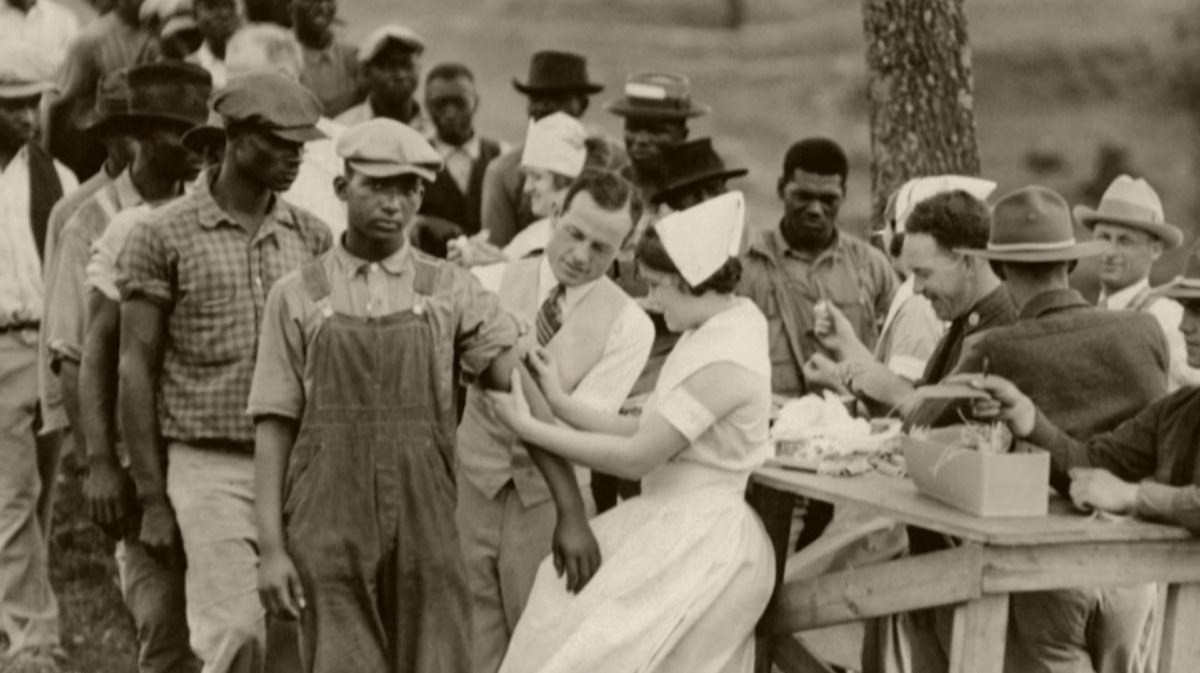
Black men have blood drawn by a nurse in Tuskegee, Alabama in the infamous Tuskegee syphilis study for which the Milbank Memorial Fund is publicly apologising for its role [File: National Archives/AP]
Tuskegee, June 12 (RHC)-- For almost 40 years starting in the 1930s, as U.S. government researchers purposely let hundreds of Black men die of syphilis in Alabama so they could study the disease, a foundation in New York covered funeral expenses for the deceased.
The payments were vital to survivors of the victims in a time and place ravaged by poverty and racism. Altruistic as they might sound, the payments – $100 at most – were no simple act of charity: They were part of an almost unimaginable scheme.
To get the money, widows or other loved ones had to consent to allowing doctors to slice open the bodies of the dead men for autopsies that would detail the ravages of a disease the victims were told was “bad blood.”
Fifty years after the infamous Tuskegee syphilis study was revealed to the public and halted in 1972, the organization that made those funeral payments, the Milbank Memorial Fund, is publicly apologizing to the descendants for its role.
The apology and an accompanying monetary donation to a descendants’ group, the Voices of our Fathers Legacy Foundation, was presented on Saturday in Tuskegee during a gathering of children and other relatives of men who were part of the study.
The current president of the fund, Christopher F Koller, said there was no easy way to explain how its leaders in the 1930s decided to make the payments, or to justify what happened. “The upshot of this was real harm,” Koller told The Associated Press in an interview.
Generations later, some Black people in the U.S. still fear government healthcare because of what’s called the “Tuskegee effect.”
Endowed in 1905 by Elizabeth Milbank Anderson, part of a wealthy and well-connected New York family, the fund was one of the nation’s first private foundations.
Historian Susan M Reverby, who wrote a book about the Tuskegee study, researched the Milbank Fund’s participation at the fund’s request. She said the apology could be an example for other groups with ties to systemic racism.
“Confronting it is difficult, and they didn’t have to do this. I think it’s a really good example of history as restorative justice,” she said.
Starting in 1932, government medical workers in rural Alabama withheld treatment from unsuspecting Black men infected with syphilis so doctors could track the disease and dissect their bodies afterwards. About 620 men were studied, and roughly 430 of them had syphilis.
The Milbank Memorial Fund got involved in 1935 after the U.S. surgeon general at the time, Hugh Cumming, sought the money, which was crucial in persuading families to agree to the autopsies, Reverby found.
Reverby’s study said Milbank recorded giving a total of $20,150 for about 234 autopsies. The payments became less important as the Depression ended and more Black families could afford burial insurance, Reverby said.
Years later, books including Reverby’s, Examining Tuskegee, The Infamous Syphilis Study and Its Legacy, published in 2009, detailed the fund’s involvement.
But it was not until after George Floyd’s death in 2020 at the hands of Minneapolis police that discussions among the Milbank staff prompted the fund’s leaders to re-examine its role in the study, Koller said. “Both staff and board felt like we had to face up to this in a way that we had not before,” he said.
Besides delivering a public apology to a gathering of descendants, the fund decided to donate an undisclosed amount to the Voices of our Fathers Legacy Foundation, Koller said. The money will make scholarships available to the descendants, Head said.
The group also planned a memorial at Tuskegee University, which served as a conduit for the payments and was the location of a hospital where medical workers saw the men infected with syphilis.
While times have changed since the burial payments were first approved nearly 100 years ago, Reverby also said there was no way to justify what happened.
“The records say very clearly, untreated syphilis,” she said. “You don’t need a PhD to figure that out, and they just kept doing it year after year.”

